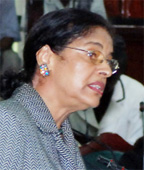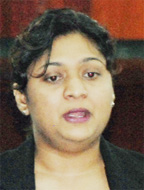-reaping of financial rewards to be criminalized
Two bills, which seek to modernize the laws governing the legal status of children and adoptions, were yesterday unanimously passed by the National Assembly, in a move deemed as progressive in the effort to protect the basic human rights of Guyanese children.
The two pieces of legislation were passed with amendments after each of the two bills was sent to a Special Select Committee for consideration and report.
The Status of Children Bill 2009 will pave the way for all children, whether they are of biological parents, adoptive parents or born in or out of wedlock, to have equal legal status. It will also give the courts the right to declare on application to determine parentage and cater for parentage testing procedures like DNA testing, among a host of other reforms.
The Status of Children Bill 2009 will repeal and re-enact the provisions of the 1983 Children Born Out of Wedlock (Removal of Discrimination) Act 1983, and sets out the manner in which wills or other instruments made on and after May, 1983 are to be interpreted.

Meanwhile, the Adoption of Children Bill 2009 stipulates that authorities charged with making adoption orders consider the best interests of the child, both in childhood and in later life as being “of paramount consideration.” It provides that the adoption is to be regarded as a service for the child and not for adults wishing to acquire the care of the child. Indeed, the Bill states that no adult has a right to adopt the child and if the child is able to form his/her own views on a matter concerning adoption, he/she shall be given an opportunity to express those views freely and those views are to be given due weight in the circumstances. The law provides that the child’s given name or names, identity, language and cultural and religious ties should, as far as possible, be identified and preserved.
Best interests of
the child
The bill proposes that determining the best interests of the child, the decision maker is to have regard to any wishes expressed by the child, the child’s age, gender, maturity, level of understanding, and background and family relationships and any other characteristics of the child that the decision maker thinks are relevant. Additionally, other factors to be weighed would include the child’s physical, emotional and educational needs, including the child’s sense of personal, family and cultural identity, as well as any disability that the child has, any wishes expressed by either or both of the parents of the child. The suitability and capacity of each adopter, or any other person, to provide for the needs of the child and alternatives to the making of an adoption order, are also to be weighed
Human Services and Social Security Minister Priya Manickchand described the bills as modern ones which benefited from widespread consultations and from the expertise of both local and overseas experts.
Speaking specifically about The Status of Children Bill, she said that this bill benefited from the expert advice of individuals from the Guyana Association of Women Lawyers as well as an expert from UNICEF, who was involved in the drafting of the bill. The Minister said that the bill sought to create an environment where discrimination against children cannot exist and added that the piece of legislation reflected the world’s changes since 1983. She stated that the bill, “unlike similar legislation in the region and internationally, takes into consideration advances in technology for assisted reproduction and eliminates areas of discrimination which persists in similar legislation elsewhere.”

Manickchand also said that the bill brings the nation into conformity with several international treaties including the Convention on the Rights of the Child and the Convention on the Elimination of all forms of Discrimination against Women as well as the RIAD guidelines which have been set up to protect minors.
In relation to the Adoption of Children Bill 2009, Manickchand pointed out that this piece of legislation was part of the PPP/C’s Manifesto of 2006 and reflects enlightened changes in the world and recognizes children’s rights. She said that the bill reflected the Ministry’s policy in dealing with children.
According to Manickchand, whenever a child is found in difficult circumstances, he or she is removed from those circumstances. The child is then held in an environment that is child friendly, she added. She explained that every attempt is made to reintegrate the child with their family and she said that Ministry will offer parents what they need to ensure that child has what he or she needs. She said that where children cannot be reintegrated with their parents, efforts will be made to foster them. The Minister disclosed that a foster care programme is in the pipelines. She said when this is not possible, they will be kept in institutional care. She said that when these children can be adopted t hey will be adopted. About 600 children are in orphanages locally, the Minister said.
She said the new bill will clarify issues relating to adoption and suggested that it would make the adoption process easier. The Minister, meanwhile, pointed out that in most local adoption cases, the children are adopted by relatives. She stated that there are few cases where “strangers” adopt children.
PNCR-1G MP Clarissa Riehl indicated her party’s support of the bill. She said that the bills were welcomed and acknowledged their usefulness in protecting the rights of children. In relation the Status of Children Bill, she identified this as being “comprehensive” and said that this was “21st century legislation”. She said that society had made progress in removing stigma attached to children born out of wedlock and said that this bill was a continued step along the right direction.
Alliance For Change MP Latchmin Punalall, in her short presentations indicated her party’s support for both bills. Quoting from the Holy Bible, the MP emphasized that children were important to God and that parents had a responsibility to their children. Speaking about the Adoption Bill, she said that ideally a child should be brought up by their God-fearing biological parents, but pointed out that the society was far from perfect and as such adoption was necessary. While acknowledging the virtues of the bills, she emphasized that they needed to be executed in the best interests of the children.
Attorney-at-law Anil Nandlall spoke for the Government and said that the bill was a welcome piece of legislation even as he stated that the government has always placed emphasis on youth and their development. He said that the bill was necessary so as to address the changes in society.
He pointed out that the government did not hastily adopt the bills but had extensive consultations with various stakeholders in excess of a decade.
The attorney said that the implementation of the Adoption Board, which the bill proposes, is necessary and welcome. He said that the new legislation also clearly identifies issues that were missing in the previous legislation. He identified the criminalizing of the reaping of financial rewards in the adoption process as an important issue addressed in this bill. He also said that the person who wishes to adopt a child must be 65 or younger. He explained that this was to ensure that the parent would be physically able to look after the child. He stated that under the new bill, when the child reaches a certain age must agree to the adoption. He also said that the bill addressed the issue of overseas persons adopting Guyanese.
PPP/C MP Mohamed Khan spoke on the Status of Children Bill while Government member Shirley Edwards spoke briefly on the Adoption Bill.
